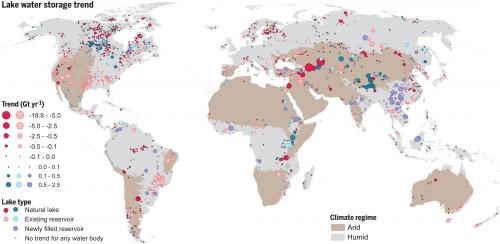
https://www.science.org/doi/10.1126/science.abo2812?cookieSet=1
Climate change and human activities increasingly threaten lakes that store 87% of Earth’s liquid surface fresh water. Yet, recent trends and drivers of lake volume change remain largely unknown globally. Here, we analyze the 1972 largest global lakes using three decades of satellite observations, climate data, and hydrologic models, finding statistically significant storage declines for 53% of these water bodies over the period 1992–2020. The net volume loss in natural lakes is largely attributable to climate warming, increasing evaporative demand, and human water consumption, whereas sedimentation dominates storage losses in reservoirs. We estimate that roughly one-quarter of the world’s population resides in a basin of a drying lake, underscoring the necessity of incorporating climate change and sedimentation impacts into sustainable water resources management
From the Guardian
https://www.theguardian.com/environment/2023/may/19/more-than-half-of-th...
"More than half of the world’s large lakes and reservoirs have shrunk since the early 1990s – chiefly because of the climate crisis and human consumption – intensifying concerns about water supply for agriculture, hydropower and human consumption, a study has found."










Add new comment